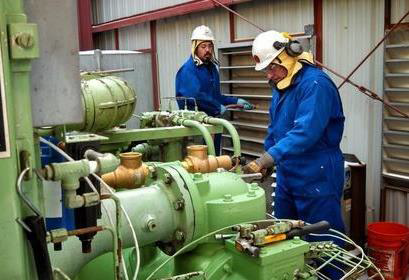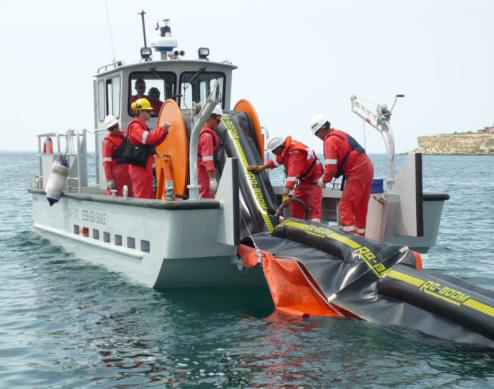COURSE OVERVIEW
HE1958 : Environmental Safety Management

OVERVIEW
| COURSE TITLE | : | HE1958 : Environmental Safety Management |
| COURSE DATE | : | Feb 02 - Feb 06 2025 |
| DURATION | : | 5 Days |
| INSTRUCTOR | : | Mr. Eric Matthews |
| VENUE | : | London, United Kingdom |
| COURSE FEE | : | $ 8800 |
| Register For Course Outline | ||
OTHER SCHEDULED DATES
| **---- No Other Scheduled Dates ----** |
Course Description
This practical and highly-interactive course includes real-life case studies and exercises where participants will be engaged in a series of interactive small groups and class workshops. This course is designed to provide participants with a detailed and up-to-date overview of Environmental Safety Management. It covers the importance of environmental safety in oil and gas operations including the regulatory requirements and best practices; the local and international environmental laws and regulations and specific environmental compliance standards; the principles and processes of environmental impact assessments (EIA) and its application in oil and gas projects; the key components of EMS (ISO 14001 framework); the benefits of implementing EMS in oil and gas; the environmental hazards in oil and gas exploration and production; and conducting risk assessments for environmental safety.
Further, the course will also discuss the emergency response plans for oil spills and leaks; the role of environmental emergency teams; the major air pollutants in oil and gas operations and the techniques for controlling emissions; handling oil spills and wastewater treatment and best practices for water conservation and reuse in oil fields; the causes and impact of soil contamination in oil operations and remediation techniques for contaminated soil; the types of waste generated in oil and gas production and safe disposal and recycling practices; handling, storing, and disposing hazardous materials in a safety manner; and the regulatory requirements for hazardous waste management.
During this interactive course, participants will learn the techniques for preventing oil spills and containment and recovery strategies in case of a spill; designing and implementing environmental monitoring systems; monitoring air, water, and soil quality in oil and gas operations; collecting and interpreting environmental data and compliance with regulatory reporting requirements; the environmental audits and non-compliances; the environmental sustainability reporting, stakeholder engagement and transparency in reporting; the environmental incident investigation techniques, root cause analysis and corrective action plans; the resource efficiency and optimization and managing water, energy, and other resources sustainably; the climate change, carbon management and renewable energy integration in oil and gas; the biodiversity management, environmental risk assessment tools, methodologies and risk mitigation strategies in oil production; the green procurement, sustainable supply chain strategies and life cycle assessments in the oil and gas supply chain; the technological innovations in environmental safety and environmental safety leadership and culture; the best practices in environmental safety management, corporate social responsibility (CSR) and environmental stewardship; and the emerging global trends in environmental regulations and preparing for stricter environmental compliance in oil and gas.
link to course overview PDF
Further, the course will also discuss the emergency response plans for oil spills and leaks; the role of environmental emergency teams; the major air pollutants in oil and gas operations and the techniques for controlling emissions; handling oil spills and wastewater treatment and best practices for water conservation and reuse in oil fields; the causes and impact of soil contamination in oil operations and remediation techniques for contaminated soil; the types of waste generated in oil and gas production and safe disposal and recycling practices; handling, storing, and disposing hazardous materials in a safety manner; and the regulatory requirements for hazardous waste management.
During this interactive course, participants will learn the techniques for preventing oil spills and containment and recovery strategies in case of a spill; designing and implementing environmental monitoring systems; monitoring air, water, and soil quality in oil and gas operations; collecting and interpreting environmental data and compliance with regulatory reporting requirements; the environmental audits and non-compliances; the environmental sustainability reporting, stakeholder engagement and transparency in reporting; the environmental incident investigation techniques, root cause analysis and corrective action plans; the resource efficiency and optimization and managing water, energy, and other resources sustainably; the climate change, carbon management and renewable energy integration in oil and gas; the biodiversity management, environmental risk assessment tools, methodologies and risk mitigation strategies in oil production; the green procurement, sustainable supply chain strategies and life cycle assessments in the oil and gas supply chain; the technological innovations in environmental safety and environmental safety leadership and culture; the best practices in environmental safety management, corporate social responsibility (CSR) and environmental stewardship; and the emerging global trends in environmental regulations and preparing for stricter environmental compliance in oil and gas.
TRAINING METHODOLOGY
This interactive training course includes the following training methodologies as a percentage of the total tuition hours
LecturesWorkshops & Work Presentations
Case Studies & Practical Exercises
Videos, Software & Simulators
In an unlikely event, the course instructor may modify the above training methodology before or during the course for technical reasons.
VIRTUAL TRAINING (IF APPLICABLE)
If this course is delivered online as a Virtual Training, the following limitations will be applicable
| Certificates | : | Only soft copy certificates will be issued to participants through Haward’s Portal. This includes Wallet Card Certificates if applicable |
| Training Materials | : | Only soft copy Training Materials (PDF format) will be issued to participant through the Virtual Training Platform |
| Training Methodology | : | 80% of the program will be theory and 20% will be practical sessions, exercises, case studies, simulators or videos |
| Training Program | : | The training will be for 4 hours per day starting at 09:30 and ending at 13:30 |
| H-STK Smart Training Kit | : | Not Applicable |
| Hands-on Practical Workshops | : | Not Applicable |
| Site Visit | : | Not Applicable |
| Simulators | : | Only software simulators will be used in the virtual courses. Hardware simulators are not applicable and will not be used in Virtual Training |
RELATED COURSES

HE0249 : Certified Quantitative Risk Assessment (QRA) Profesional
- Date : Dec 08 -Dec 12 / 3 Days
- Location : Dubai, UAE
- Course Details Register

HE0929 : NEBOSH International Technical Certificate in Oil and Gas Operational Safety
- Date : Nov 17 -Nov 21 / 3 Days
- Location : Dubai, UAE
- Course Details Register

HE0793 : Oil Spill Management & Response (IMO OPRC Level 1 & 3)
- Date : Nov 17 -Nov 21 / 3 Days
- Location : Doha, Qatar
- Course Details Register

HE0790 : Oil Spill & Pollution Control
- Date : Dec 01 -Dec 05 / 3 Days
- Location : Dubai, UAE
- Course Details Register
